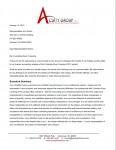Podcast: Download (Duration: 4:04 — 5.6MB)
Vancouver-based forensic accountant Tiffany Couch urged members of the Washington State House Committee on Transportation in Olympia to investigate irregular financial practices associated with the $10 billion* Columbia River Crossing Light Rail project.
Couch gave a 20-minute presentation to six members of the 29-person committee last week, saying that the financial accounting of the Washington State Department of Transportation (WSDOT) and the CRC are rife with questionable contracting practices, lack of appropriate reporting, discrepancies with task orders, and non-compliance with public records requests.
Couch’s full findings are contained in a white paper she also published last week.
Members of the 29-person committee present included Rep. Ann Rivers, R-La Center; Rep. Ed Orcutt, R-Kalama; Rep. Mike Armstrong, R-Wenatchee; Rep. Paul Harris, R-Vancouver; Rep. Jim Moeller, D-Vancouver; and committee chair Rep. Judy Clibborn, D-Bellevue.
Transcript of audio story below:
COUV.COM: Tiffany Couch, a nationally respected forensic accountant based in Vancouver, traveled to Olympia to address state legislators and transportation experts on her independent findings of the Columbia River Crossing Light Rail project. Her report covered the project’s out-of-control spending.
Couch: It is my professional opinion that the accounting and contracting practices for the CRC project are characterized by irregularities, and planning missteps on many fronts. This project is suffering from a severe lack of accountability, transparency, and oversight.
COUV.COM: Absence of proper accounting procedures was a consistent thread through her 20-minute address, which led Couch to ask for a CRC timeout.
Couch: These irregularities are of a sufficient depth to warrant an intervention on this project, and perhaps a termination or delay until procedures are in place that will provide for centralized accounting, and financial decision making, and compliance with federal and state contracting standards.
COUV.COM: Couch’s research included examining contracts and uncovering the money trail. When she discovered there was no clear documentation of CRC finances, Couch pieced the bread-crumb trail together on her own by sifting through the data dump.
Couch: When I read the interstate agreement, it clearly says that the states are going to share equally in costs. Washington’s actually put in about $13 million more. The CRC and the WSDOT was unable to provide me with any report that would show me the expenditures that were paid by the CRC. That doesn’t exist. They literally provided me with 28,000 lines of data that I had to then interpret…and said, “Do it yourself.”
Which I did.
COUV.COM: The CRC’s accounting procedures lacked clear direction, concise processes, and lacked logic. The vendor list had multiple accounts for some vendors, while other vendors didn’t exist at all.
Couch: We’ll have vendor names that are entered four or five times. We know that they’ve paid $2 million to VancouverCenter. It’s rent. It’s in the check register. VancouverCenter is not listed as a vendor anywhere.
COUV.COM: Couch sought simple, normal reports that any accountant would ask for.
Couch: We don’t have a budget to actual report. We don’t have a job cost report. We don’t have a balance sheet, an income statement. We have nothing that would be a typical accounting report that people can look at and make good decisions on.
COUV.COM: Markups taken by David Evans and Associates, the primary vendor of the CRC, appear to far extend those that are normally accepted in the business world.
Couch: They were allowed to markup every single billable hour by 172.82 percent for an overhead rate, and then on top of that an additional 31 percent for a profit margin.
COUV.COM: Task orders are buried under multiple change orders resulting in costs far outpacing the amount agreed upon in the contract and the spending continues.
Couch: There are 11 task orders, eight of which were over budget and over time. And we’re not talking about a little bit over budget. We’re talking about 63 change orders that included $25M in additional costs. The only three task orders that they came in on budget and on time were all worth less than a $150,000.
COUV.COM: Is it fraud? Drawing that conclusion is not the role of an auditor. So what is Tiffany Couch’s opinion?
Couch: Currently the project’s spending nearly $2M a month. The Washington State Department of Transportation data is a mess. They’ve been unwilling, unfortunately thus far, to even meet with me for me to understand why these discrepancies exist.
I’m saying there are red flags here that need to be investigated.
CREDITS
Audio edited by Ed Stortro
Voice over by Carol Doane
* The well-documented cost to taxpayers, if the CRC stays on budget, is $10 billion. This was established by the Cortright Report (PDF) which used data from an independent review panel hired by the governors of Washington and Oregon. (View the panel’s final report.)
Tiffany Couch’s CRC White Paper:
See our continuing coverage of the Columbia River Crossing Light Rail project.
Do you have information to share on the CRC? To respond anonymously call 260-816-1426. To allow your comments to be used on COUV.COM call 260-816-1429.











